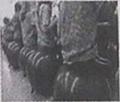题目内容
Scientist Without Laboratories
When you hear the word “scitentist”, what do you think of? Many people think scientist are people in clean white coats who work in labs. And some scientists do work in labs. But there are 26 scientist who work in woods and jungles. These scientists are called “animal behavior (行为) scientists”, and they study animals as they live in nature.
Why don’t these scientists catch animals and study them in zoos? The 27 is in the word “behavior”. Animals behavior scientists want to learn 28 animal behave in their wild homes. When animals live in cages (笼子) or in zoos, they do not act the same as they do when they are 29 . They may fight 30 each other, or they may not eat, or they may not raise (抚养) their babies as they usually would. To see real animal behavior, scitentists must go where the animals 31 .
So animal behavior scientists go into the jungles, the woods or the desert. There , their most important 32 are their eyes and ears. They watch and listen to the animals very 33 . They write down everything that happened in notebook. 34
they live near the animals, the scientists are careful not to frighten them. If the scientists are luncky, the animals will 35 no attention to them. Then the scientists can see how the animals really live.
The behavior scientists hope what they’ve learned about animal behavoir can provide clues (提供线索) to help people learn to live together more happily.
When you hear the word “scitentist”, what do you think of? Many people think scientist are people in clean white coats who work in labs. And some scientists do work in labs. But there are 26 scientist who work in woods and jungles. These scientists are called “animal behavior (行为) scientists”, and they study animals as they live in nature.
Why don’t these scientists catch animals and study them in zoos? The 27 is in the word “behavior”. Animals behavior scientists want to learn 28 animal behave in their wild homes. When animals live in cages (笼子) or in zoos, they do not act the same as they do when they are 29 . They may fight 30 each other, or they may not eat, or they may not raise (抚养) their babies as they usually would. To see real animal behavior, scitentists must go where the animals 31 .
So animal behavior scientists go into the jungles, the woods or the desert. There , their most important 32 are their eyes and ears. They watch and listen to the animals very 33 . They write down everything that happened in notebook. 34
they live near the animals, the scientists are careful not to frighten them. If the scientists are luncky, the animals will 35 no attention to them. Then the scientists can see how the animals really live.
The behavior scientists hope what they’ve learned about animal behavoir can provide clues (提供线索) to help people learn to live together more happily.
| 小题1: |
|
| 小题2: |
|
| 小题3: |
|
| 小题4: |
|
| 小题5: |
|
| 小题6: |
|
| 小题7: |
|
| 小题8: |
|
| 小题9: |
|
| 小题10: |
|
小题1:B
小题1:A
小题1:C
小题1:B
小题1:D
小题1:A
小题1:B
小题1:B
小题1:C
小题1:A
【主旨大意】文章介绍了人们所不熟知的另一种科学家---研究动物行为的科学家。文章介绍了他们为什么生活在森林里、丛林里的原因及他们的工作特点。
小题1: another表示“再,又” other“另外的,其它的,别的” others“表示除去一部分以后的另一些,二不是剩下的全体” the other“表示一定范围内出去一部分后其余的全体”
小题1: 由上文“为什么这些科学家不把动物捉回来在动物园里研究”可知答案是。
小题1:“科学家想了解动物在自然的家里是如何表现的。”
小题1: “当动物们生活在笼子里或动物园里,他们与在无拘无束情况下的表现是不一样的。”
小题1: 与……打架,fight …with
小题1:“想了解动物真正的行为,科学家必须去动物生活的地方”
小题1: 由下文的“听、看动物”可知“他们最重要的工具是眼睛和耳朵”
小题1: 为了了解动物的行为,必须“认真地观察和听动物。”
小题1:“尽管科学家生活在动物附近,但他们尽量小心认真而不去吓到动物们。”
小题1:固定短语pay attention to “注意”
小题1: another表示“再,又” other“另外的,其它的,别的” others“表示除去一部分以后的另一些,二不是剩下的全体” the other“表示一定范围内出去一部分后其余的全体”
小题1: 由上文“为什么这些科学家不把动物捉回来在动物园里研究”可知答案是。
小题1:“科学家想了解动物在自然的家里是如何表现的。”
小题1: “当动物们生活在笼子里或动物园里,他们与在无拘无束情况下的表现是不一样的。”
小题1: 与……打架,fight …with
小题1:“想了解动物真正的行为,科学家必须去动物生活的地方”
小题1: 由下文的“听、看动物”可知“他们最重要的工具是眼睛和耳朵”
小题1: 为了了解动物的行为,必须“认真地观察和听动物。”
小题1:“尽管科学家生活在动物附近,但他们尽量小心认真而不去吓到动物们。”
小题1:固定短语pay attention to “注意”

练习册系列答案
相关题目

 ngly about the use of balls as chairs that she started WittFitt. She said the company not only encourages the use of balls but also educates teachers and students on how to use them. "We sell balls in 24 s
ngly about the use of balls as chairs that she started WittFitt. She said the company not only encourages the use of balls but also educates teachers and students on how to use them. "We sell balls in 24 s tates in America, three provinces in Canada and Japan." says Witt.
tates in America, three provinces in Canada and Japan." says Witt.